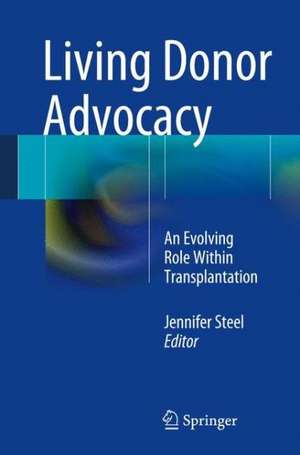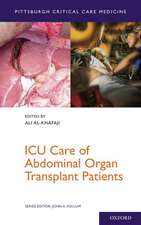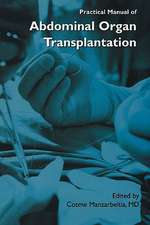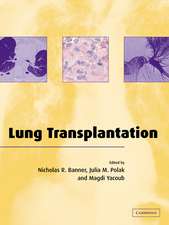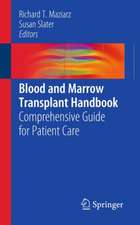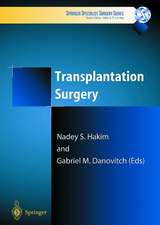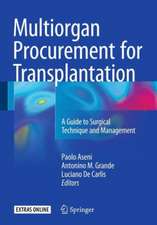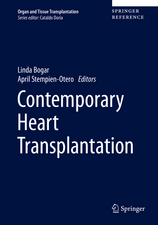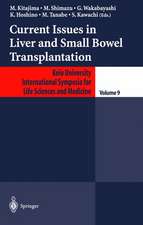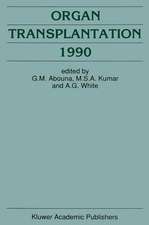Living Donor Advocacy: An Evolving Role Within Transplantation
Editat de JENNIFER STEELen Limba Engleză Paperback – 22 noi 2013
Preț: 468.47 lei
Preț vechi: 493.12 lei
-5% Nou
Puncte Express: 703
Preț estimativ în valută:
89.65€ • 97.35$ • 75.31£
89.65€ • 97.35$ • 75.31£
Carte tipărită la comandă
Livrare economică 22 aprilie-06 mai
Preluare comenzi: 021 569.72.76
Specificații
ISBN-13: 9781461491422
ISBN-10: 1461491428
Pagini: 356
Ilustrații: XV, 362 p. 53 illus., 25 illus. in color.
Dimensiuni: 155 x 235 x 22 mm
Greutate: 0.54 kg
Ediția:2014
Editura: Springer
Colecția Springer
Locul publicării:New York, NY, United States
ISBN-10: 1461491428
Pagini: 356
Ilustrații: XV, 362 p. 53 illus., 25 illus. in color.
Dimensiuni: 155 x 235 x 22 mm
Greutate: 0.54 kg
Ediția:2014
Editura: Springer
Colecția Springer
Locul publicării:New York, NY, United States
Public țintă
Professional/practitionerCuprins
Part I: Living Donation: Chapter 1: The Medical Selection of Live Donors,- Chapter 2: Kidney Paired Donation Programs for Incompatible Living Kidney Donors and Recipients.- Chapter 3: Living Donor Liver Transplantation.- Chapter 4: Intestinal Transplantation from Living Donors.- Chapter 5: Living Donor Lung Transplantation.- Chapter 6: Live Donor Pancreas Transplantation.- Part II: Living Donor Advocacy: Chapter 7: The History of Living Donor Advocacy in Living Donor Transplantation.- Chapter 8: Findings from a National Survey of Living Donor Advocates.- Chapter 9: The Independent Donor Advocate and the Independent Donor Advocate Team.- Chapter 10: Clasification of Living Organ Donors.- Chapter 11: Unrelated Donors.- Chapter 12: Education of the Donor by the ILDA (Psychosocial Aspects).- Chapter 13: Components and Timing of the ILDA Evaluation.- Chapter 14: Contraindications to Living Donation from an ILDA Perspective.- Chapter 15: Management of Conflict Between the Independent Living Donor Advocate and the Transplant Team.- Chapter 16: Story Behind the Story.- Chapter 17: Living Donor Experience.- Part III: Living Donor Ethics: Chapter 18: Informed Consent for Living Organ Donation.- Chapter 19: Pressure and Coercion.- Chapter 20: Financial Considerations.- Chapter 21: Autonomy, Agency, and Responsibility: Ethical Concerns for Living Donor Advocates.- Chapter 22: A Practical Guide: Role of the Independent Living Donor Advocate: Protect or Advocate or Is It Both/And?.- Chapter 23: Racial Disparities in Kidney Transplant and Living Donation.- Chapter 24: The Evolution of the Role of the Independent Living Donor Advocates: Recommendations for Practice Guidelines.
Recenzii
From the reviews:
“This is a well written, thorough review of the role that independent living donor advocates (ILDAs) play in evaluating and counseling potential donors. … The book is well written with interesting case studies. … This will be a very useful resource in most transplant centers.” (Anitha Vijaan, Doody’s Book Reviews, March, 2014)
“This is a well written, thorough review of the role that independent living donor advocates (ILDAs) play in evaluating and counseling potential donors. … The book is well written with interesting case studies. … This will be a very useful resource in most transplant centers.” (Anitha Vijaan, Doody’s Book Reviews, March, 2014)
Notă biografică
Jennifer Steel is an Independent Living Donor Advocate (ILDA) at the University of Pittsburgh Medical Center’s Transplant Center. She is also on the executive committee of ILDAs for the National Kidney Foundation, and recently published the results of a national survey of ILDAs in the American Journal of Transplantation and completed a webinar for the Department of Health and Human Services concerning living donor advocacy.
Textul de pe ultima copertă
The inadequate supply of organs in the United States and other countries continues to drive the reliance on living donor transplantation. Representatives of the transplant community convened for a meeting on living donation in an effort to provide guidelines to promote the welfare of living donors. The consensus statement that resulted from this meeting recommended that transplant centers retain an Independent Living Donor Advocate (ILDA) to focus on the best interest of the donor. Over a decade later, nearly every transplant center in the United States, performing living donor surgeries, has incorporated an ILDA into their living donor screening and/or evaluation process, however there are no guidelines with regard to the ILDA’s qualifications, clinical practice, or how address ethical challenges.
Living Donor Advocacy is an overview of living donation and its risks, ethical challenges and future directions regarding this role within the transplantation process. This book provides health care professionals or consumers of health care with information that facilitates their understanding of the complexity of the living donor surgeries and medical contraindications, evaluation of the donor, and bioethics involved in living donation.
Living Donor Advocacy brings the fragmented information in the literature together into a single, invaluable resource for health professionals and those undergoing transplantation or living donor surgery.
Caracteristici
A comprehensive overview of live organ donations and its risks, challenges and future directions Facilitates better understanding of the complexities of living donor surgeries, patient evaluations and ethics Beneficial to healthcare professionals and patients undergoing transplantation or living donor surgery Includes supplementary material: sn.pub/extras
